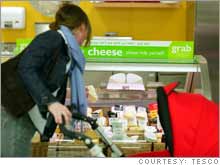|
Wal-Mart, Kroger, Safeway better watch out. The British are coming!
Analysts say U.K. grocer Tesco's entry into the U.S. with a "mystery" format could shake up traditional food retailing.
NEW YORK (CNNMoney.com) - Wal-Mart, Kroger, Safeway, 7-Eleven -- be warned. U.K.'s largest grocer Tesco is readying an assault on your home turf with a new "mystery" format that analysts say could leave its U.S. competitors "shaking in their boots."
Scott Langdoc, vice president of retail with market research firm AMR Research, said Tesco had been dabbling around the edges of the U.S. food retailing market for years. Most recently, Tesco looked into possibly acquiring key parts of the Albertson's (Research) grocery chain, which last month agreed to be bought by a consortium of companies. After much speculation, Tesco finally announced it would enter the United States through the West Coast by 2007. The company shied away from providing details about the new stores and their locations other than to say they would be based on its "Tesco Express" convenience store model. For those retailers most affected, Langdoc said Tesco's news is "strategically equivalent to if Wal-Mart was opening across the street from all of their stores." On one end, traditional supermarket chains have struggled to compete effectively against the stiff challenge from Wal-Mart (Research), the nation's largest seller of low-priced groceries through its supercenter stores. At the same time, they're also getting squeezed on the other end by the growing popularity of organic food stores like Whole Foods and other premium food chains. Now comes Tesco, which isn't just another Wal-Mart. "It plays the market differently, and retailers that don't take heed and act accordingly will have nothing but an uphill climb," Langdoc said. New player has strong credentials
Merrill Lynch analyst Patricia Baker said Tesco's arrival could only be viewed as a "negative" for the conventional supermarket channel. "The coming of Tesco represents not only a new player but one that is a quite accomplished retail entity with the ability to attack this market in a much more meaningful fashion over the long term, should it choose to do so," she wrote in a recent research note. Based in Cheshunt, England, the Tesco Group currently runs about 2,500 stores in the United Kingdom and 12 other countries in Europe and Asia. Tesco operates four different retail formats. Tesco Express, a smaller store format of up to 3,000 sq. feet, sells fresh produce, wine and in-house baked goods; mid-size Tesco Metro stores range between 7,000 to 15,000 sq. feet; larger Tesco supercenters of between 20,000 to 50,000 sq. feet also carry non-food items like DVDs and books and Tesco "Extra" stores of over 60,000 sq. feet have a more varied product mix including clothing, housewares, electronics, cosmetics and garden furniture. The company last year reported profits of $3.5 billion on total sales of $65 billion. That's still significantly smaller than the $312 billion in revenue Wal-Mart garnered with twice as many stores. If you want to compare Tesco and Wal-Mart, Langdoc said you should look at the performance of both retailers in the U.K., where Wal-Mart already directly competes with Tesco through its ASDA grocery stores. According to Langdoc, ASDA is struggling in the U.K. against fierce competition from leader Tesco. "Wal-Mart even complained about Tesco's 30 percent market share of the supermarket sector in the U.K. and asked the government to investigate," Langdoc said. "This shows that Wal-Mart is keeping a close eye on Tesco." Perhaps Tesco is doing the same. Industry watchers point out that the company may have decided to enter through the West Coast first because that region of the country is not yet dominated by Wal-Mart. What's the mystery behind Tesco's U.S. stores?
Tesco indicated that it will spend more than $400 million a year to build its U.S. stores. Langdoc estimates that the initial investment could pay for 100 to 150 stores. Dan Longo, editorial director with trade publication Convenience Store News, said the retailing industry is abuzz with speculation about Tesco's plans. "One industry analyst told me that the stores will be cash-and-carry stores, which are ideal for people who are strapped for time and looking for convenience in getting in and out of stores quickly with what they need for the week," Longo said. But unlike a typical convenience store like 7-Eleven, he doesn't think the Tesco store will sell gas. "I think these [Tesco stores] will almost be a cross between a grocery store and a convenience store, like a small format grocery store of about 5,000 sq. feet that sells plenty of fresh foods," Longo said. Langdoc agreed. "This type of a small-format grocery store doesn't exist right now in the U.S. This will be Tesco advantage here. Fresh produce like fruits and vegetables, and high quality private-label goods will be a significantly greater proportion of their merchandise mix versus packaged goods." What does this mean for big-box rivals such as Kroger and Albertson's? Said Longo, "If there is a silver lining for U.S. retailers, it's that Tesco's coming will hopefully spur more innovation. Wal-Mart has been pushing them to rethink their existence and go after the high-end, ethnic and organic areas. There's more pressure on them now." Wal-Mart did could not be reached for comment. -------------------------- Click here to read more about companies who aren't spooked by Wal-Mart. Retailers say they're still committed to Gulf states. Click here to read more. Is "toy" becoming a dirty word? Click here for more.
Click here to read about Wal-Mart's challenge in China. |
|


